Do I really need a range hood?
I've never had a range hood before. They seem incredibly expensive and there seem to be a lot of complaints about them being noisy. I'm getting a 36" duel fuel range. That makes the range hoods even more expensive. If it's noisy, I know myself well enough to know that I probably won't even turn it on.
So, instead of a range hood, how about a metal potrack? I do understand I can't put combustible items directly above the range.
Am I nuts? Do I really need a range hood? For people who have had them and not have them, what differences did you notice?
Comments (56)
Buehl
14 years agoIf you're concerned about noise, here's an excerpt from something I posted on the Vent Hood thread (with corrections on how angles are measured for ducting):
The major factors affecting effectiveness & noise:
* Number of turns: Every turn increases noise & decreases effectiveness. Try for angles o (measured on the outside angle). 90o angles reduce effectiveness by quite a bit. (Don't even think of an angle > 90o (again, measured on the outside angle)!)
* Length of duct run: The longer the run, the less effective and the noisier it will be
* Size of duct: If you use duct that is smaller than recommended, your hood will be noisier & less effective
* Location of fan: Internal fans (the ones in the hood directly over the cooking surface) are louder than external or remote fans (located outside)
Note: See the linked thread for the angle explanation.
Here is a link that might be useful: Thread: Vent Hood Advice, Please!!!!!!!!
lascatx
14 years agoYes, or at least as Kate said -- if you plan on cooking. I had a very noisy downdraft before and didn't use it that often, but even one you don't like using, you do need. Even better is one you don't mind using and find does something good for you.
I posted some time back about making popcorn for at least 120 kiddos at school one day. I did both stove top and used up what micro popcorn I had, so everything wasn't' right under the vent. Not wanting to smell stale popcorn for days, I turned that puppy up high and rand it the whole time I was popping and bagging. I took a brake and went to the back of the house -- came back and didn't smell anything until I came into the kitchen. After I delivered all the bags to the school, I came back in and didn't smell any popcorn -- nor did DH when he came home -- and my clothes didn't smell of popcorn. Combine that with the experiences with grease and filth stuck to everything (grease will trap dust and dirt) and you have reason enough to want a vent hood. Add to that that if you ever have a fire in your kitchen, that grease on the walls and cabinets will act like starter at a cookout and spread that fire faster and farther.
Related Professionals
Brownsville Kitchen & Bathroom Designers · Saratoga Springs Kitchen & Bathroom Designers · Town 'n' Country Kitchen & Bathroom Designers · University City Kitchen & Bathroom Remodelers · Emeryville Kitchen & Bathroom Remodelers · Honolulu Kitchen & Bathroom Remodelers · Manassas Kitchen & Bathroom Remodelers · Red Bank Kitchen & Bathroom Remodelers · South Barrington Kitchen & Bathroom Remodelers · Aspen Hill Cabinets & Cabinetry · Fort Lauderdale Cabinets & Cabinetry · Lakeside Cabinets & Cabinetry · National City Cabinets & Cabinetry · Milford Mill Cabinets & Cabinetry · La Canada Flintridge Tile and Stone Contractorsccoombs1
14 years agolascatx, the odor elimination is one reason I love mine so much too. I can fry fish and someone coming into my house right after dinner can't even pick up a hint of fish smell. It's really a wonderful thing to have after so many years of cooking with substandard hoods.
plllog
14 years agoDo a lot of shopping. There are some hoods that are really quite quiet, especially if you're not using a pro-style blast furnace type range.
Also, look into continuous controls. Modern Aire hoods come with those, and I think I read something about people adding them to units that don't. With a continuous control, you can start the hood at lowest when you're heating your pan, turn it up to highest while you're browning and sauteing, then find an appropriate place anywhere between for simmering. On a good hood (which are worth the price!) a lot of the noise is as much the rush of air as the machinery. It dosen't take that long ot learn how much draw you need for the task at hand.
Downdrafts are better than nothing, but really don't work well, especially with gas. Heat, steam, smoke, aerosolized grease, etc., all go up. For a downdraft to be strong enough to pull all that down it needs to have a lot more suckage than they do.
cooksnsews
14 years agoSome jurisdictions do require kitchen ventilation beyond a window that opens. New building standards result in tight, energy efficient homes, so a vent is necessary to regulate indoor air quality. Renovations in such jurisdictions usually must adhere to the same standards.
naan
14 years agoI don't know your style, but what about a unique, retro look?
There's this 36" one, Nutone, old,used, but very cool looking.THe look of it might get you over the "i don't want a range hood" part. And it's cheap. And I know the seller and she's really nice.
Here is a link that might be useful: nutone range hood, inexpensive and very stylin'
Buehl
14 years agoThere's no comparison b/w downdrafts & wall hoods...downdrafts are marginally effective for the burners right next to it and with small pots at best...usually, they're not very effective at all.
Buehl
14 years agoMy parents have never had a hood...and it definitely shows! There's grease build up on the cabinets above, the ceiling, and the wall next to the range. When we were growing up it was the kids' job to wipe the cabinets & wall down when we did the dishes but in all honesty, it didn't get done that often. With all of the kids gone, it rarely gets done and it really, really shows it. I've tried to clean them somewhat when I'm visiting, but I never get to the bottom of the gunk.
plllog
14 years agoIt's the uppers that get yucky. And gas has the products of combustion to be rid of.
When I lived abroad I had an LP gas ring and a small fridge. Certainly nothing like a hood! I also did a lot more frying because there was no oven, toaster, MW, etc. Though there was an exterior door right there, and a lot of drafts. The lack of a good, pulling vent hood wasn't so much something one noticed on a day to day basis. Of course, it smelled when things were cooking! Of course, the walls needed scrubbing! No surprise the cart holding the gas ring got greasy!
Life is ever so much nicer with a hood! So find one you'll be excited to turn on, rather than one that bothers you.
msgreatdeals
14 years agoI agree with Judydel. I had a gas range with vent in this house for the past 18 years. I also sold my cabinets on CL and I had only cleaned them once in the range area. My ceiling had a tiny light grease film also.
My 5 burner 30" gas top is in the peninsula and there are no cabinets near by. I have two windows 6 feet away and a glass panel door 10 ft away. NO venting. Love it! Being in S. CA it's about 70 degree's year round.donka
14 years agoHmm...weather, I never thought of that, but I guess that would make a difference; I'm in the Northeast and my windows are closed 6 months out of the year, so I need some good ventilation. Especially since the fall/winter is when I'm doing most of my cooking inside with the windows closed.
Summer is BBQ season and winter is stews and pastas and roasts. That may be a consideration I've never thought of (having lived here forever.)
msgreatdeals
14 years agoI was born in MA but raised in CA. I would say weather is very important. If I couldn't open my windows much then for sure I would have some type of venting system.
judydel
14 years agoI live in Connecticut and I've had no probs without venting. In the winter if I'm boiling a lot of water the windows in the stove area may get steamed up. So what.
eks6426
Original Author14 years agoThank you everyone for the response. It looks like I do need a hood. I live in snowy northern Indiana so keeping the windows open isn't an option very often. I'm doing off-white cabinets with a considerable amount of open shelving. I'm guessing all this points to needing a hood.
So, how about this one:
plllog
14 years agoHave you chosen your range yet? That will help determine whether this hood will work for you. The "quiet mode" is good for low heat/low fumes things. The high setting is as good or greater than "standard", which is 600 cfm, but it might be pretty loud on high. Whether the draw is enough will depend on the output of your stove, though most of us don't use all the burners on high all at once.
Garden Web doesn't make URL's into links. Either use the URL box, or HTML. It's a messy URL anyway, and I had to massage it. Here's the picture and features below:

Features:
* 4-speed powerful yet quiet internal blower with electronic button control.
* Halogen lights effectively brighten the cooking surface.
* Stainless steel baffle filters provide style and professional grease-trapping ability (dishwasher safe).
* The Delay Shutoff feature conveniently shuts off the power automatically after a 30-second time delay.
* 18-Gauge Commercial Grade Stainless Steel - Satin FinishDimensions:
* 9" High
* Top range hood depth (mounts under cabinet) Â 12"
* Total range hood depth  22"
* Width  29.75" to 35.75"Product Specifications:
* Twin Vertical Turbine Impeller
* 4 Speed electronic button control
* 250 CFM (QuietModeTM) / 1.2 Sone (42dB) to 720 CFM / 4.5 Sone (62dB)
* Top 6" Round & 7" Round Adapter
* 2 Halogen Lights (12V 20W) for 30" & 36
* Baffle Filter
* 2-Year ManufacturerÂs Parts and Labor Warranty.eks6426
Original Author14 years agopllog--thanks so much for posting the range hood. I didn't know how to do anything beyond the messy link. Yes, I have chosen and purchased a range. It's a DACOR 36" duel fuel range that I got a terrific deal on because it was a showroom model. There were other ranges I liked better, but this one fit the budget better. So, it will be a gas cooktop. So, would the range hood above work? I'm looking for quiet.
The range hood will be on an outside wall and I will need to vent out the wall, not the roof (2nd story above).
So, would the range hood above work?
biochem101
14 years agoI bought an inexpensive range hood on EBay. Don't really have a clue but it was probably made in China. It works GREAT (6 months now) and it's so quiet on the low setting (90% of the time) that I go into the family room and forget it's on (big doorway connected to kitchen). I was REALLY worried it was junk and I'd be sorry, but I did it anyway and I'm not! :D
Everyone MUST use the hood when cooking and you can see the smoke being pulled right up into it. (and I've only booted it up to Medium in a few instances.) Nothing on my white cabinets. In fact, the other night I was noticing that areas near the range I used to wipe grease off frequently weren't getting dirty. It's worth it for that alone. And the smells!
It doesn't have to be fancy to be well worth it. (Although in my next life I'd like a Modern Aire...).
plllog
14 years agoHTH with the pic/specs.
Wikipedia says this about sone as a measure of sound:
Source of sound sound pressure sound pressure level loudness
pascal dB re 20 µPa sone
TV set at home level, 1 m distant 2ª10^2 ca. 60 ~ 4
normal talking, 1 m distant 2ª10^3 - 2ª10^2 40 - 60 ~ 1 - 4So at top speed, the hood is about equivalent to loud talking or a TV just a tad louder than normal. In the normal bustle of cooking at high heat, even that top setting shouldn't be annoyingly loud.
Does this sound like your range? I got this off a store's website for the Dacor 36" dual fuel, since their website was taking too long to load:
 (2) SimmerSearTM Burners with Melting Feature (18,000 BTU)
 (2) Sealed Gas Burners (16,000 BTU)
 (2) Sealed Gas Burners (8,500 BTU)To find the standard recommendation for the number of BTU's (British Thermal Units, i.e., the amount of power), add them up and divide by 100. That is, have one CFM for each 100 BTU's.
Your total, if the above specs are accurate, is 85,000 BTU's maximum outupt, which would be 850 cfm, recommended. Generally for a powerful gas range they also recommend that the hood be a couple inches bigger on each side than the cooking surface.
The answer therefore, assuming that you're never going to crank up all six burners to max at the same time, is that the hood you're looking at is just barely big enough (not quite 36", where 42" would be better) and just barely strong enough (720 cfm where your max would want 850 cfm).
It'll work. It'll be a lot better than the alternatives.
eks6426
Original Author14 years agopllg--I knew I was close on the CFM's for the range hood. I will very rarely use all 6 burners on this stove. Maybe a couple times of year tops. It does have a removable griddle which I will definitely use.
I've still got some wiggle room in my layout so I MIGHT be able to accomodate a 42" hood. My space is pretty small so I am trying to not overpower it..I basically have one wall for the kichen that is 18 feet long not counting the fridge. Kitchen is 9' wide.
I'd really like to put a cabinet above the range hood. I am very open to recommendations & suggestions.
gracesantacruz
14 years agoalways had same question.
We have used no hood for years. No cabinets above or on 3 feet either side, just windows. Would simply open windows if it got too smelly or smokey or turn on the downdraft unit (Jenn-air -a bit noisy).We do keep our door/windows open often because we are in mild CA. I think if I were in a place where the climate is more extreme, I'd want a good, quiet vent and use it often.
andreanewengland
14 years agoI am amazed! Where do those of you live who don't have a vent? Were those kitchens permitted/inspected by the local building dept?
Residential building code requires a ventilation system! Opening a window is absolutely not the same; it's passive. I'm not a pro, but I've custom built in a couple of states and when I searched it, it does appear to be required everywhere. Legality aside, everyone is right, you will have a horrible buildup of grease and odor without it.fleur222
14 years agoI also did not have a working vent, prior to my ongoing remodel. I would never recommend it. As others have said, it seems to be required, and it does cause horrible buildup of grease and odor! I can not wait to have a vent!!!!
davidro1
14 years agobelieve it or not
there are apartment dwellers who like to eat certain foods in restaurants....
because they avoid cooking them at home.Same thing applies to homeowners with a $40 kitchen vent.
Same thing applies to homeowners with no kitchen vent.
Some people just don't think they'll need it.
Not many, but a few.
If one's cooking choices are limited by habits acquired in a previous lifetime (when you had no vent), this could be one reason.
.remodelfla
14 years agobiochem... do you mind sharing which ebay seller you purchased the hood from? I'm going to need a 42" hood and really prefer to keep the cost under a grand. I want one of those curved steel and glass ones.
dchall_san_antonio
14 years agoI agree with Judydel, too. Our house was built in San Antonio in 1939 and had a covering over the gas stove with a passive hole in the middle. When we remodeled the kitchen in 2000, we had it removed and installed custom made cabinets painted white. We have a window directly behind the stove and cabinets above and on both sides. We don't have odors or grease. I'm a little bit more fanatical about soil buildup than my wife, and I'm telling you we don't have any grease buildup. We don't cook a lot of greasy food but we do fry something with oil or butter at least weekly.
I think the reason they are required by code is to slow down a fire if one starts.
wildebloem
14 years agoI live in a 1926 house - no hood. When I deep-fry something, the smell does hang around for a bit. I always have windows open for fresh air though, which helps clear the air. There is no build-up of grease or any other unpleasant coating on the cabinets over the stove.
The new house we are building will have a downdraft because some such venting is required by code and because I would like the option. I will have a ceramic cooktop - I cannot tolerate open gas flames (hood or no hood) without nasty reactions - and I will probably only use the thing for the more persistent odors. Other than that, I love the smells of cooking foods. For me, it is an essential and pleasant part of cooking and anticipating a good meal.
morgne
14 years agoWildebloem,
I'd be grateful to hear what the nasty reactions are to the open gas flames. I'd appreciate it immensely.
M.
kitchennews
14 years agoMight not help but in the UK Cooker Hoods are quite often required under Building Regulations for new builds and extensions - and they keep smell and grease levels down
Here is a link that might be useful: New kitchen products and news reviewed
azstoneconsulting
14 years agoEks6426:
I would say that now - in the year 2009 - here in the USA - there's
this thing called a "building code" that in most places - requires that
you do put in some means of evacuating the heat and fumes from
a cooking surface, Especially gas ranges.....I'd say - plan on having one - or installing one before you sell the house
(whenever that day comes) because the new owners will not be able to get
a C of O (Certificate of Occupancy) the day or so before you close on selling
the house you decided not to put a range hood in......I know that it;s prolly NOT what you wanted to hear, but in most municipalities
it;s the way things are....HTH
kevin
wildebloem
14 years agomorgne: I have asthma. The house we currently live in is a 1926. It does not have a hood (or room for one), it does have a number of windows, and I always have at least one open. Some time ago, when we remodeled our kitchen, we also switched to natural gas. Over the next six months, the asthma worsened terribly. We checked everything we could think of. Finally, I called the American Lung Association. They sent a booklet with items to check. One possible culprit was an open gas flame. We did not think that was the problem though, because my symptoms were constant whenever I stepped into the kitchen, whether we were cooking or not. Still, we turned off the wonderful new stove to make sure. Within days, I was back to normal. We had to get rid of the stove because although a hood may have helped during cooking, it was the consistent exposure to the oven pilot that apparently caused the problem.
I hated to get rid of that range. Worse, I could not find another to fit the space for over a month. The gas company finally helped us out by finding an electric range in Seattle that we had shipped down. Ugliest thing you ever saw.
We are building a new house right now and although we have natural gas for secondary heat and other services (all closed systems), I will have a ceramic/glass cooktop and electric ovens.
ccoombs1
14 years agowildebloem, most modern gas ranges and cooktops do not have pilot lights anymore. Most (not all) have electronic ignitors that spark the gas flame. I didn't realize though that a gas flame could be such an irritant!
desertsteph
14 years agoI heard that about gas stoves on the news this past yr. with so many people having breathing problems it surprised me that so many on here get gas stove.
I cooked on a gas stove until I moved out at 18 (and my sisters an I did most all of the cooking - from a very young age) and we never had a vent or hood. all the yrs I was married (15) I cooked on electric w/o a vent or hood. I had new cabs when I moved in and never had a build up of grease - tho I did wash them down a few times a yr.
the only times I had a vent was in the 90's in rentals. 1 didn't even work.
While it is the thing to do these days, people have cooked for many generations without them.
Maybe it has to do with houses being so more tightly sealed and closed up with heat and a/c.
Buehl
14 years agoNext time I'm there, I'm going to have to take a pic of my parents' kitchen to show everyone what happens over the years when you don't have a range/vent hood...not a pretty sight!
southernstitcher
14 years agoI was going to keep my useless ventless range hood, thinking it would be too expensive to install vented. But, after this morning's "gourmet" breakfast cooked by a visitor, and I came to work smelling like grease and onions (and I was nowhere near the stove!), I'm getting a quote from my contractor!
And yes, as davidrol said, I have adjusted the way I cook. To my husband's dismay I don't fry - ever. I have to say that my cabinets and ceilings are not gunked with grease, and I have cabinets right by the stove. Nor are they cracking with moisture. But, to be able to cook with abandon will be nice.wildebloem
14 years agoccoombs1: I understand stoves now are pilotless (as I mentioned, that remodel was some time ago). Still, after those emergency room visits, although our new house will have venting, there is no way I would use open flame anything ever again. I opted for a downdraft. They are not as efficient, but I will only use the thing for the more unpleasant side effects of cooking. Other than that, I enjoy the cooking fragrances - while I definitely do not enjoy the ruckus of a fan.
morgne
14 years agoWildebloom,
I appreciate you being willing to share. I too suffer from breathing issues and have carefully built my home accordingly (we ultimately got an induction top for what that's worth).
I've seen more and more reports on issues with gas appliances and have been taking note of personal stories I've heard for quite some time. Many people still scoff at the possibility of the gas stoves being an issue (I recently shared a thread on this same subject with some who are unconvinced) so while I'm dismayed for your situation I'm glad to be able to hear another story that is direct experience. Thank you again for that.
When I'm working with someone on a design it can be difficult to emphasize enough the great need for proper ventilation and avoiding inner air protection based on simply case studies.
M.
Here is a link that might be useful: Previous gas appliance discussion
wildebloem
14 years agomorgne: I am sure some people do scoff at gas stove issues - especially those who experience no problems. I only wish I were one of them.
It is well-documented, not at all a new idea that an open flame can create respiratory problems. But it obviously does not affect everyone in the same way, just as not everyone reacts adversely to wool, peanuts, cats, whatever. Oh well, luck of the draw, as "they" say.
In my case, it simply is not an option to use an open flame. Not that I mind, really: I love to cook, but I am not overly fond of clean-up, and a smooth surface is far easier to clean than individual burners.
I glanced at induction but do not know enough about it to make the leap (yet?). I have not yet made final decisions on appliances though (and I intend to keep my head firmly stuck in the sand until someone drags me out - what an absolutely horrific task to make all of those choices). Why did you choose induction over electric?
morgne
14 years agoWildebloem,
(Love the name by the way!)
I had a couple of reasons. I have a "super insulated" home with walls 10" thick so every scent or heat source seems to be trapped forever once it's created. I wanted a cooktop that would provide the least amount of heat to get the job done. That's definitely induction. Since only the pot is heated up there's no wasted or residual heat so the air around the ctop stays substantially cooler. There were a whole host of "wins" in the end for induction like efficiency, safety and ease of use. I felt it was a clear winner over the electric in the end. It helped that a 3 in-a-row burner was offered and I had my heart set on that configuration.
But it's also worth noting that I'm a techie. I've always got the newest computer, the newest phone, whatever, so I'm very comfortable with new tech. Not that induction is new tech but it sure feels like it!
I'll also admit that my mother had an electric glass top for a while which drove me batty. It seemed to take FOREVER to heat up food. I'm assuming they are better now but I always felt like it was invented just to tick me off. How I hated that thing! Lol.
melanie1422
14 years agoI've never had a WORKING hood - sure, there's been a hood in every home I've lived in, but none of them ever worked.
I never noticed a problem with my own cooking. My roommates... were always a terrible mess, and burned a lot of things, and I always wished for an exhaust fan for their cooking.
When I demo'd the kitchen in this house, there was a nasty layer of grease that was a cheesy consistency all over the wall behind and beside the stove. But again - I attribute that to idiots not cleaning up after their splatters, and not the non-working hood.
I'd say that the majority of the houses in my older neighborhood have stoves that are free standing - away from the cabinets. And therefore, they can't have under cabinet hoods, and so they have NO hoods. I live in an area where the golden oak of the 90s and uba tuba granite is considered the "high class" kitchen style. People would be shocked to see what people on GW are doing. No hood kitchens are no big deal, because all people have ever seen are the under cabinet, no vent to the outside, exhaust fans.
I'll have a working exhaust fan in my new kitchen. It won't be venting to the outside. I know - sacrilege! But it will be better than anything I've had before!
wildebloem
14 years agomorgne: thank you for the information about induction tops. How do you like cooking with it? Is it everything you had hoped for? Any surprises - good or bad? I am not much of a techie, but I am not afraid of change, either - as long as it does not take long enough to figure out for my patience to run out, that is.
melanie1422 and others: I do not have a hood in our current 1926, but I definitely do not have cheesy anything above the stove or on the cabinets. Is it grease or? I would be concerned about fire if there is that much grease build-up.
cooksnsews
14 years agoCount me among those surprised by any connection between gas appliances and breathing problems. I live in a city of 1 million residents, where 99+% of homes are heated by gas furnaces, and have been for almost 100 yrs. I've never heard of anyone being advised to find another heat source for health's sake. For sure, our furnaces are firing for many more hours per day, for at least 8 months per year, than anyone's stove is operating. Very few furnaces are closed systems - most combustion products go up the chimney, but some circulate throughout the house.
judydel
14 years agoKevin,
I'm not sure where you are getting your information regarding needing a stove exhaust in order to get a CO. I called our town building inspector and he was surprised I would even ask the question. He said it isn't the town's business if a person installs a hood/vent or not. It doesn't do anything regarding a fire or safety. They are expensive, noisy, and in many kitchens not necessary IMO. My opinion on this is well documented on GW. Never had one, never needed one . . . no grease or yuk build up. Love the smell of food cooking, etc.cooksnsews
14 years agoIt is important to remember that building codes are local, and continually subject to change. They are not national, international, or universal. GW members can only give general advice, beginning and ending with "Consult your local authorities" during the planning stages to avoid unpleasant/expensive surprises.
morgne
14 years agoWildebloom,
I've only had mine for a short while so I'm not the best judge. So far so good! I'd hate to tell you it's great and then have time prove me wrong. Also, I got an AEG 98001 shipped in from Germany (not as expensive or high end as it sounds) so the chances of you haveing a product by the same people is slim and I'd hate to steer you wrong on what an american induction behaves like.
But there are tons of people around who have had them going for years now on the forum. If you get a chance to do a search for "induction" in this part of the forum you'll get a billion opinions. Most of the debate is induction vs gas but the reviews of induction are there to be found in between the arguements! Lol. I think it's safe to say that most people really like theirs. There is one person I remember who felt they had a really bad experience but I do think that person is in the minority.
Here is a link that might be useful: My cooktops
sandsonik
14 years agoI hope it's not too late to tack my own question onto this thread and get some answers from GW!
I have a free-standing gas stove on an inside wall in a two story house with a recirculating, non-vented range hood, and it's crapped out. In my dream kitchen of the future, I'd be able to afford relocating the range to an outside wall and venting it properly.
But for now, it is what it is and I really need to get something to replace it, even though I know recirculating vents are only a little better than absolutely NOTHING. So, here's my question - should I get another cheapo recirculating hood, or a microhood?
The pros and cons: The microhood might require me to take a little off the bottom of the cabinet over the stove in order to get proper clearance. It would also require getting an electrician to put in a proper outlet (and lose more cabinet space) because I believe they all need an outlet rather than being hard wired like an old school hood. On the other hand, I like the idea of having more counter space by moving the micro and I like the idea of having the micro at eye height - IF there is no trade-off of venting ability and light quality.
On the third hand, a range hood is much cheaper. BUT I would like a stainless steel one and haven't found those in the cheaper non-vented kinds. I could pay more and get a convertible one and then I think you have to buy the charcoal filter separately also. My stove is a Kenmore (made by Frigidaire) stainless look with a black top so I could go with either black or stainless or stainless look, if there is such a thing. I'd prefer a stainless or stainless look that matched the stove's finish.
If any of you have had the micro-range hood and a non-vented range hood, how do the two compare? I understand that both are poor substitutes for a true vented hood, but does a typical recirculating vent work better than a microwave/range hood that's also unvented?
I guess I'm torn between replacing my current hood with a $40 black version or paying $100+ to get a stainless version that won't work any better than the black one, or paying $300 for a microwave version that won't work any better than the other two but will provide an extra function - though the microwave I have now works just fine, thank you! Also, it seems I read lots of complaints about microhoods not performing very well or lasting very long.
PLEASE HELP!
plllog
14 years agoSandsonik, how likely is it that you really will redesign your kitchen within the next year or two? Because your question is really about budget, not vent hoods. If you're serious about remodelling, which you might well be since you're here, I say save as much as you can stand looking at and apply it to the remodel.
Re the main topic: I just visited someone who has an old house (more than 100 years, I think, at least 80 to look at), keeps his windows open, has dogs, smokes (lightly), and has an old pro gas range (not a pro-style). He also has a great hood, but doesn't always remember to turn it on. He used to be a pro, but in kitchens where the vent went on with the lights and stayed on all the time. His place isn't dirty, but I can smell more than the day's smells, and I can see where particulates have adhered. Dog fur is a much bigger issue in his life. He and his wife were arguing about which vacuum dealt with it better. So he doesn't notice the difference when the hood isn't on.
I think a lot of it might be sensitivity. If you're really sensitive to odors, etc., it makes a much bigger difference whether you have a good hood. Realistically, age and smoking have a lot to do with it. People often lose some of their sense of smell with age (it's happening to me and I'm not quite AARP age yet), and smoking definitely limits it. I've known smokers who seemed to have good smellers, but when they quit we learned that they'd been using the smokes as a way to limit the super-smellers that had been given them at birth. Whereas I won't even keep the windows open for long because I can't stand the dirt that blows in.
None of this is meant to offend anybody--just to say that if you're more sensitive to smells, and don't have environmental factors that compete for attention, it's more important to have a good hood.
wildebloem
14 years agoTotally agreed: if you are not sensitive to natural gas range flames/dogs/cats/peanuts/wool/whatever, it is difficult to comprehend how much damage such sensitivities or allergies can do a person's life.
If you tend to be sensitive, I would not buy natural gas anything that has an open flame. Or, if your heart is set on it, add a good hood - and keep an eye out for potential problems.
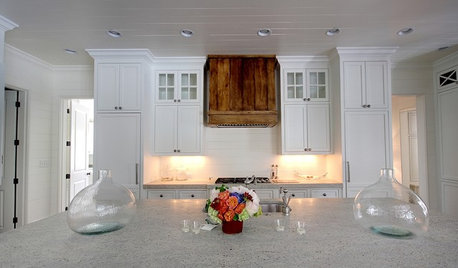
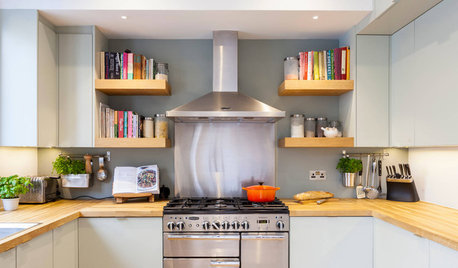
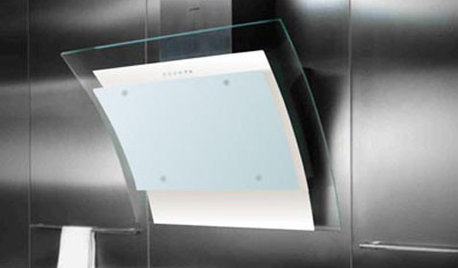
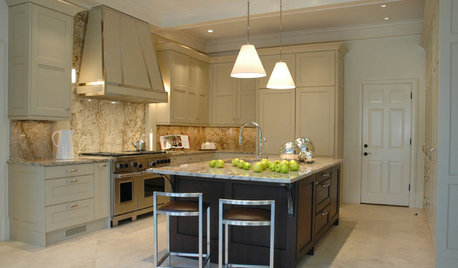
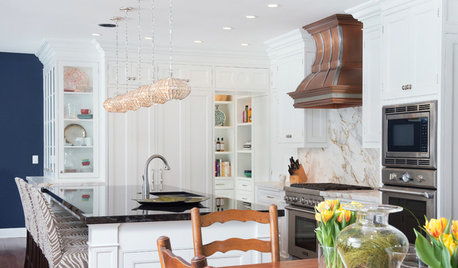
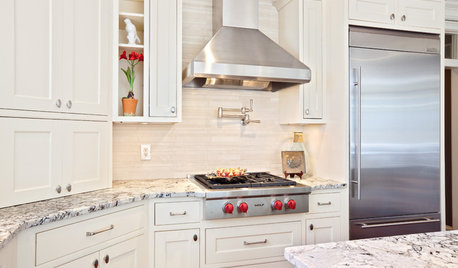
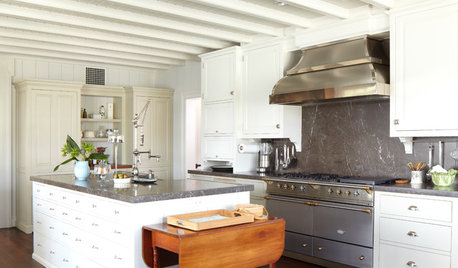
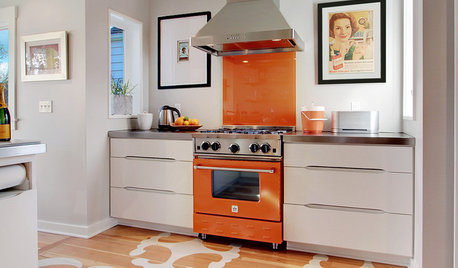
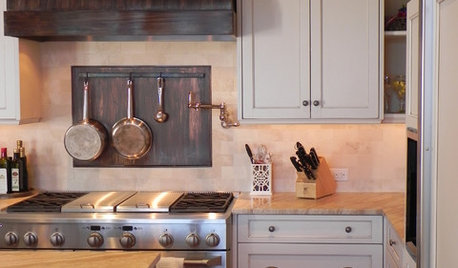






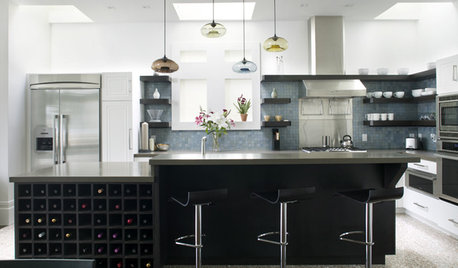
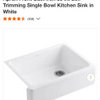



judydel